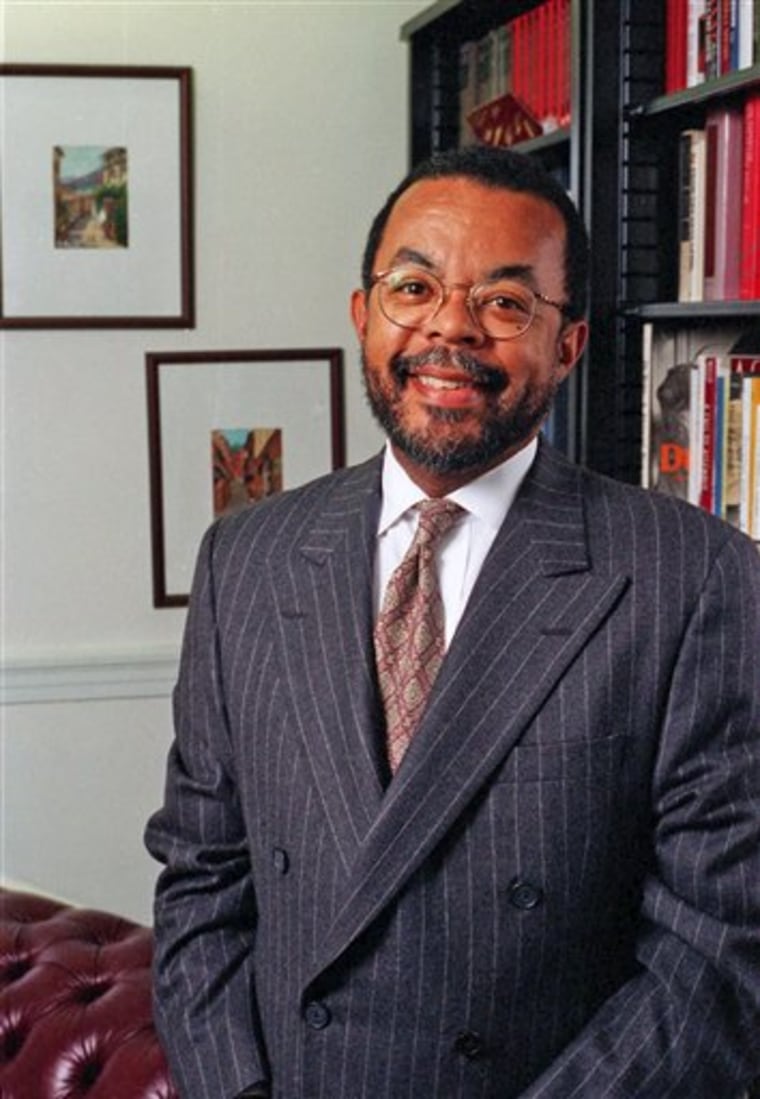Decades ago — long before Harvard, long before his books and documentaries — Henry Louis Gates Jr. and some friends nearly set off a brawl trying to integrate a West Virginia club.
Gates and the others were circled by a white mob. The owner screamed at the black students to leave, slamming one of them against the wall. The club was shut down, but Gates had been marked: West Virginia police, he would write in his memoir, placed him on a list of those who might be detained should race riots break out during election time.
"Someone in authority had decided I was dangerous?" he wrote. "I mean, I liked to think so."
Gates rarely has been considered a dangerous man. Gregarious, outgoing, media-savvy — yes. But in the years after the incident in Keyser, W.Va., his unrelenting focus on black life in America was intellectual. He has written essays, compiled reference works, searched for slave narratives, produced documentaries, assembled a mighty team of colleagues at Harvard.
"He's unquestionably one of the great public intellectuals. He puts people together, he makes a million speeches. He's on airplanes a lot. I think he has 50 honorary degrees by now," says David Remnick, editor of The New Yorker, for which Gates has been a contributor.
Now a dispute with police has brought Gates down into the arena again.
Reached Thursday by telephone, Gates told The Associated Press he had no further comments to make about the incident, in which he was suspected of breaking into a house — his own — and then charged with disorderly conduct when he raged at a police officer.
Delves into black history with fervor
Gates' life has been an almost perfect arc of energy and ascent. A mill worker's son, he graduated with honors from Yale and has devoted himself to discovering and explaining the very marrow of the black past.
As head of the W.E.B. Du Bois Institute for African and African American Research at Harvard, Gates has consciously attempted to build upon Du Bois' scholarship and to live out, and up to, his place in what Du Bois called "The Talented Tenth" of black elites.
Gates' projects have included an encyclopedia of Africans and African Americans, an anthology of African American literature and documentaries about Abraham Lincoln and "The Wonders of the African World." His books include an influential work of cultural criticism, "The Signifying Monkey"; and a compilation of essays, "13 Ways of Looking at a Black Man," which features pieces on Colin Powell, Louis Farrakhan and O.J. Simpson's murder trial.
"There are people who talk about President Obama being a three-dimensional chess player, operating on a lot of levels at once, and that's a good description of Skip," says fellow Harvard professor Lani Guinier, using the nickname Gates has had since childhood.
"He's entrepreneurial. He has an eye for investments and for networks that are a potential source of support. He has an eye for talent, for bringing in the best people he can to Harvard. And he has an eye for the media, for positioning himself and knowing how to present a story."
He has told his own story in a memoir, "Colored People." Gates was born in 1950 in Piedmont, W.Va., then a segregated mill community. His first knowledge of whites was through television, in sitcoms such as "The Life of Riley," which featured a factory worker, like Gates' dad. His family initially had little interest in protest, wondering why blacks would want to eat at white-owned restaurants since it was believed that whites couldn't cook.
'The little prince'
"Civil rights took us all by surprise," wrote Gates, whose life was changed, as millions were, by the 1954 Supreme Court decision outlawing the "separate but equal" laws in public schools.
Just two years later, Gates began at the Davis Free Elementary School, integrated in 1955 and virtually the only place in Piedmont where blacks and whites gathered together. Gates arrived more determined than afraid. He was "marked out to excel," an early reader and writer "blessed with the belief that I could learn anything."
"I was all set to become the little prince of that almost all-white school," he wrote.
Became 'A' student after desegregation
He was an A student who loved history and geography and would practice the way African leaders' names were pronounced by following the newscasts of Edward R. Murrow and Walter Cronkite. He gave the valedictory address at high school and graduated summa cum laude from Yale, where he majored in history.
To his eventual embarrassment, he wrote in his Yale application:
"As always, whitey now sits in judgment of me, preparing to cast my fate. It is your decision either to let me blow with the wind as a nonentity or to encourage the development of self. Allow me to prove myself."
He was substantial enough to get into Yale anyway, politicized enough to protest racism and the Vietnam War, but never so disheartened by his country that he didn't consider himself a part of it.
At Harvard, Gates is credited with turning the school's African American studies program into a "'hub' for intellectual history," Kwame Anthony Appiah said, with fellows and faculty advisers including Guinier, William Julius Wilson and Nobel laureate Wole Soyinka.
